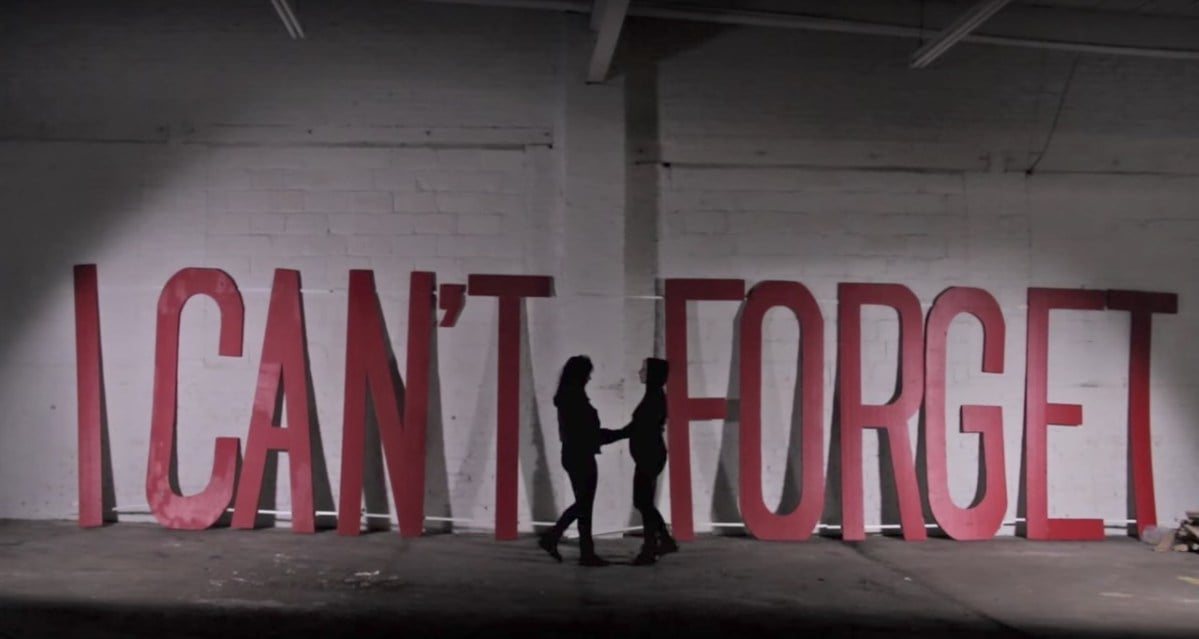Mid-September, Chicago. The weather was unseasonably warm and my shoulders were pink after spending three days outside without enough sunscreen. I was exhausted, dehydrated and slightly burned out. Nothing unusual for a day three of a music festival.
Then War on Women started to play.
A small crowd had assembled, comprised of mostly women, and as soon as the band stepped onto the stage, I found myself in the pit without consciously having walked there. As Shawna Potter started beating a piñata effigy of Donald Trump with a baseball bat a few songs into their set, the crowd started to experience a sort of symbiosis. When War on Women started playing “Say It,” I began to realize that I had never experienced anything quite like this as a female punk fan. One by one, the people around me started screaming the chorus with them.
“Say it! Say it! I was raped!”
I will never know which of the women (and men) around me were survivors of sexual assault, but as a sexual assault survivor myself, standing shoulder to shoulder with people you don’t know in a pit and feeling safe enough to scream out my assault was one of the most cathartic experiences I have ever had at a show.
I left feeling different, like a giant weight I wasn’t fully aware of had been lifted off my shoulders. I’ve always talked candidly about my sexual assault, as I believe that silence only gives my rapist power and control, but I’ve never been in a place where I could shout it (and him) down. What the punk and hardcore scene could be for women expanded exponentially as I stood in that crowd, that day, with that band.
Let’s be real: the music scene as a whole has always been unequal in its treatment of gender. Although there have been breakthrough female fronted punk and hardcore bands since its inception (X-Ray Spex, Plasmatics, The Slits), the riot grrrl movement was probably most successful at addressing the inequity in the scene in the early 1990s. Women who were unafraid to speak bluntly about what they faced (both as band members and in the crowd) started to speak up and speak loudly and people started to take notice.
For instance, Kathleen Hanna would regularly stop Bikini Kill shows and have the women move to the front so that she could see any potential harassment. If she saw anything happening, she would call it out. Bands like Sleater-Kinney, Bratmobile and 7 Year Bitch stood strong against facing down sexism and inspired their fans to do the same. It was feminism at its finest as well as a necessary response against everything that was happening politically in the 90s and early 2000’s.
Unfortunately, it has never been more obvious that we need a reinvigoration of that riot grrrl spirit. We’re facing down literal Nazis in the streets. An all male panel of politicians is dead set on trying to take away a woman’s right to choose. Trans men and women are being murdered for existing and denied their rights to even use the bathroom. People of color are facing enormously difficult barriers to succeeding in life (and even staying alive, especially in their interactions with the police).
That’s why Potter and War on Women are so vital to the scene right now. If you think women and men are treated equally, take a look at any of the comments on War on Women’s Facebook or YouTube accounts. Men, mostly white cisgender men, who “don’t care” about the band at all, still take time out of their day to tear them apart – their music, their appearance, their sex lives. It is such a frequent occurrence that they even wrote a song about it (“YouTube Comments”).
But Potter and crew does not give a fuck. They keep moving forward, writing powerful songs about rape, misogyny, trans rights, the feminist movement in general, including critiquing it in very necessary ways; stop what you’re doing right now and listen to “Second Wave Goodbye”.
Unfortunately, this can often highlight the worst parts of the scene I grew up with. It was only recently, at the age of 35 and after having been a part of the punk and hardcore community for 20 years, that I felt safe and comfortable enough to wear a dress to a show. I can’t even count the amount of sexual assaults I’ve encountered at shows—men reaching up my skirt, grinding themselves against me without my consent—that I started to subconsciously accept my part in things and victim blamed myself out of wearing anything that could make it any easier. I accepted that my body was for public consumption.
But that day, in that pit in Chicago, I decided: no more.
It’s time for us to stand up again. Bands like War on Women are bringing that spirit back. Men are starting to get it too, like when the bassist for Circa Survive walked off the stage to confront a man who was trying to kiss a woman against her will. The time is right for a reinvigoration of that riot grrrl energy and I, for one, am all in.
War on Women? Bring it on.
(image: screengrab)
Melle Hany prides herself on being an intersectional feminist badass.
Want more stories like this? Become a subscriber and support the site!
—The Mary Sue has a strict comment policy that forbids, but is not limited to, personal insults toward anyone, hate speech, and trolling.—









Published: Aug 24, 2017 04:12 pm